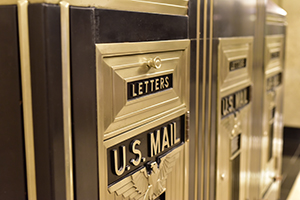Tips to Avoid Mail Theft & Check Fraud
Check Fraud is on the rise in the U.S.
Here’s what you need to know to protect yourself:
Your mail is probably pretty boring—a few bills here, some junk mail there, maybe a birthday card on an exciting day. But to a scammer, your mail contains valuable personal information.
Red Flags
- If it appears that your mail has been stolen or rifled through, you may have unwittingly become the victim of a mail theft ring.
- Items that you ordered never arrive or items that you didn’t order do arrive.
- Unauthorized charges on your monthly account statements.
- You responded to a sweepstakes letter by sending in a check to claim your prize.
Check Washing
Check washing is the process by which criminals remove the identifying marks on checks or substitute their own information onto blank checks. Criminals steal checks from mailboxes and use check-washing methods to erase details from or produce their own fake checks. These checks are used to make purchases or withdraw funds!
For protecting your own checking account:
- Pay bills online when possible.
- Mail checks directly from your local USPS office.
- Use a special check writing pen (available at most office supply stores) to help prevent check washing.
- Order checks with chemically sensitive paper to deter alteration.
- Review your FCSB bank accounts often to verify checks have cleared.
For protection against accepting fraudulent checks, train yourself and your employees on the signs of fraud including:
- Missing address or check number
- Mismatching fonts
- Handwritten additions
- Smooth edges without perforations
- Stains or discolorations
Pay attention to low check numbers. Approximately 90 percent of bad checks are drawn from accounts that are less than a year old so you can expect to see numbers that are noticeably low. This is a red flag.
Tools:
- Mail Lockbox
- Positive Pay for businesses
- Remote Deposits
Questions about your account? Call your local FCSB branch for personalized banking services. View our contact page here.



